初中英语8种时态分类练习
初中英语8种时态复习及专题练习

初中英语8种时态复习I.时态详解一、一般现在时:概念:①表现在存在的状态;②现在经常、反复发生的动作。
时间状语:always,usually,often,sometimes,everyweek(day,year,month…),onceaweek,onSund ays,etc.基本结构:①主语+be(am,is,are);②主语+行为动词原型(单三形式主语+动词单三形式)否定形式:①am/is/are+not;(is+not=isn’t;are+not=aren’t)②此时态的谓语动词若为行为动词,则在其前加don't,如主语为第三人称单数,则用doesn't,同时还原行为动词。
一般疑问句:①把be动词放于句首;②用助动词do提问,如主语为第三人称单数,则用does,同时,还原行为动词。
二、一般过去时:概念:①过去某个时间里发生的动作或状态;②过去习惯性、经常性的动作、行为。
时间状语:ago,yesterday,thedaybeforeyesterday,lastweek(year,night,month…),in1989,jus tnow,attheageof5,oneday,longlongago,onceuponatime,etc.基本结构:①主语+be(was,were);②主语+动词过去式否定形式:①was/were+not;(was+not=wasn’t;were+not=weren’t)②在行为动词前加didn't,同时还原行为动词。
一般疑问句:①was或were放于句首;②用助动词did提问,同时还原行为动词。
三、现在进行时:概念:表示现阶段或说话时正在进行的动作及行为。
时间状语:now,look,listen,atthistime,thesedays,etc.基本结构:be(am,is,are)+doing否定形式:be(am,is,are)+not+doing.一般疑问句:把be动词放于句首。
初中英语八大时态练习题
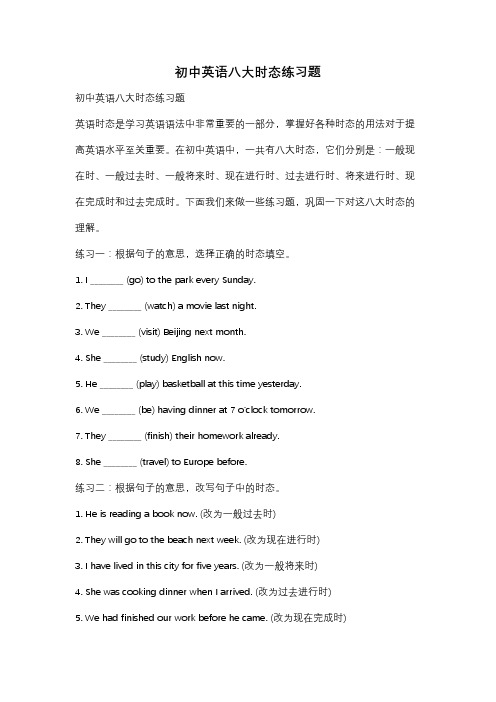
初中英语八大时态练习题初中英语八大时态练习题英语时态是学习英语语法中非常重要的一部分,掌握好各种时态的用法对于提高英语水平至关重要。
在初中英语中,一共有八大时态,它们分别是:一般现在时、一般过去时、一般将来时、现在进行时、过去进行时、将来进行时、现在完成时和过去完成时。
下面我们来做一些练习题,巩固一下对这八大时态的理解。
练习一:根据句子的意思,选择正确的时态填空。
1. I ________ (go) to the park every Sunday.2. They ________ (watch) a movie last night.3. We ________ (visit) Beijing next month.4. She ________ (study) English now.5. He ________ (play) basketball at this time yesterday.6. We ________ (be) having dinner at 7 o'clock tomorrow.7. They ________ (finish) their homework already.8. She ________ (travel) to Europe before.练习二:根据句子的意思,改写句子中的时态。
1. He is reading a book now. (改为一般过去时)2. They will go to the beach next week. (改为现在进行时)3. I have lived in this city for five years. (改为一般将来时)4. She was cooking dinner when I arrived. (改为过去进行时)5. We had finished our work before he came. (改为现在完成时)6. They have been studying English since morning. (改为过去完成时)7. He is going to the concert tomorrow. (改为将来进行时)8. I played soccer with my friends yesterday. (改为一般现在时)练习三:根据句子的意思,用正确的时态填空。
初中英语语法-八种时态详解与练习
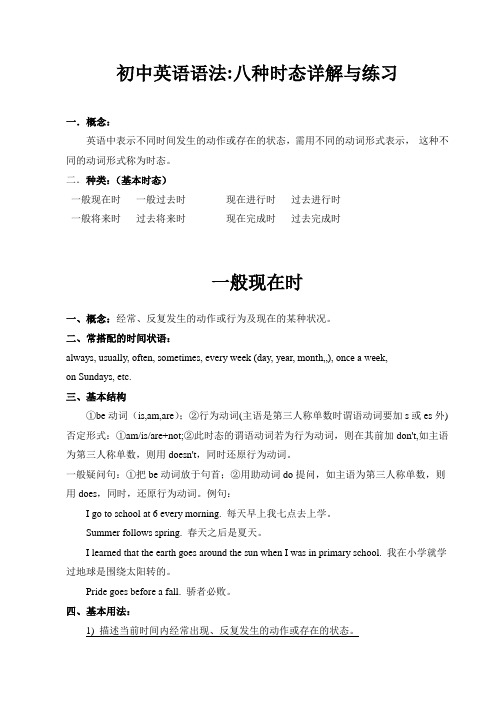
初中英语语法:八种时态详解与练习一.概念:英语中表示不同时间发生的动作或存在的状态,需用不同的动词形式表示,这种不同的动词形式称为时态。
二.种类:(基本时态)一般现在时一般过去时现在进行时过去进行时一般将来时过去将来时现在完成时过去完成时一般现在时一、概念:经常、反复发生的动作或行为及现在的某种状况。
二、常搭配的时间状语:always, usually, often, sometimes, every week (day, year, month…), once a week,on Sundays, etc.三、基本结构①be动词(is,am,are);②行为动词(主语是第三人称单数时谓语动词要加s或es外) 否定形式:①am/is/are+not;②此时态的谓语动词若为行为动词,则在其前加don't,如主语为第三人称单数,则用doesn't,同时还原行为动词。
一般疑问句:①把be动词放于句首;②用助动词do提问,如主语为第三人称单数,则用does,同时,还原行为动词。
例句:I go to school at 6 every morning. 每天早上我七点去上学。
Summer follows spring. 春天之后是夏天。
I learned that the earth goes around the sun when I was in primary school. 我在小学就学过地球是围绕太阳转的。
Pride goes before a fall. 骄者必败。
四、基本用法:1) 描述当前时间内经常出现、反复发生的动作或存在的状态。
在这种情景中,句子常带有表示频率的时间状语:always , everyday , often , once a week (month , year , etc.) , sometimes , seldom , usually等等,以表示句中的动作或状态是习惯性的、经常性的。
初中英语八大时态练习试题及答案(详解)
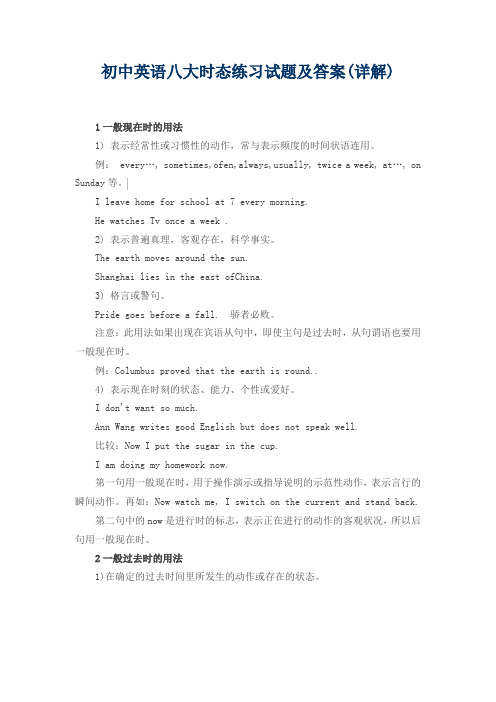
初中英语八大时态练习试题及答案(详解)1一般现在时的用法1)表示经常性或习惯性的动作,常与表示频度的时间状语连用。
例: every…,sometimes,ofen,always,usually,twice a week,at…,on Sunday等。
I leave home for school at 7 every morning.He watches Tv once a week .2)表示普遍真理,客观存在,科学事实。
The earth moves around the sun.Shanghai lies in the east ofChina.3)格言或警句。
Pride goes before a fall.骄者必败。
注意:此用法如果出现在宾语从句中,即使主句是过去时,从句谓语也要用一般现在时。
例:Columbus proved that the earth is round..4)表示现在时刻的状态、能力、个性或爱好。
I don't want so much.Ann Wang writes good English but does not speak well.比较:Now I put the sugar in the cup.I am doing my homework now.第一句用一般现在时,用于操作演示或指导说明的示范性动作,表示言行的瞬间动作。
再如:Now watch me, I switch on the current and stand back.第二句中的now是进行时的标志,表示正在进行的动作的客观状况,所以后句用一般现在时。
2一般过去时的用法1)在确定的过去时间里所发生的动作或存在的状态。
时间状语有:yesterday,an hour ago,the other day,in1982,yesterday morning(afternoon,evening…),last night(week,month,year…),a moment ago , a week ago, three years ago…just now,等。
初中英语八大时态练习试题及答案(详解)
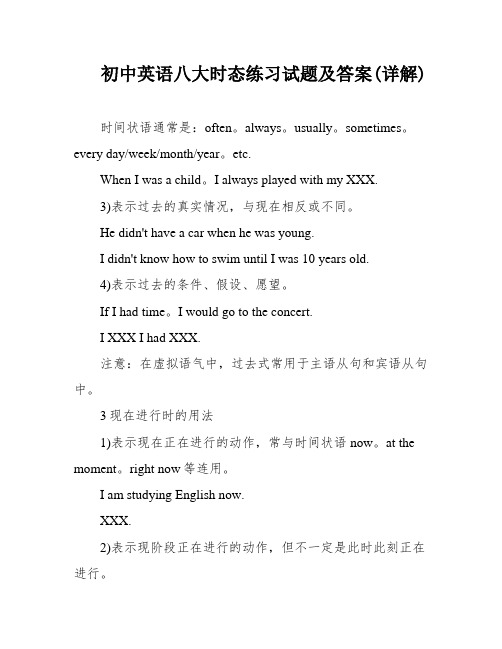
初中英语八大时态练习试题及答案(详解)时间状语通常是:often。
always。
usually。
sometimes。
every day/week/month/year。
etc.When I was a child。
I always played with my XXX.3)表示过去的真实情况,与现在相反或不同。
He didn't have a car when he was young.I didn't know how to swim until I was 10 years old.4)表示过去的条件、假设、愿望。
If I had time。
I would go to the concert.I XXX I had XXX.注意:在虚拟语气中,过去式常用于主语从句和宾语从句中。
3现在进行时的用法1)表示现在正在进行的动作,常与时间状语now。
at the moment。
right now等连用。
I am studying English now.XXX.2)表示现阶段正在进行的动作,但不一定是此时此刻正在进行。
He is learning Chinese this semester.XXX.注意:现在进行时表示的动作必须是正在进行的,而不是已经完成的或惯性的动作。
4过去进行时的用法1)表示过去某一时刻正在进行的动作。
I was watching TV when she called me.They were having dinner at 7 o'clock last night.2)表示过去某段时间内正在进行的动作。
I was XXX.He was working on the project for two weeks.注意:过去进行时强调的是动作的持续性和进行性,常与表示过去的时间状语连用。
5一般将来时的用法1)表示将来某一时刻要发生的动作或存在的状态。
I will go to the beach XXX.She will be 30 years old next month.2)表示将来经常性或惯性的动作。
初中英语语法八大时态总结及练习题
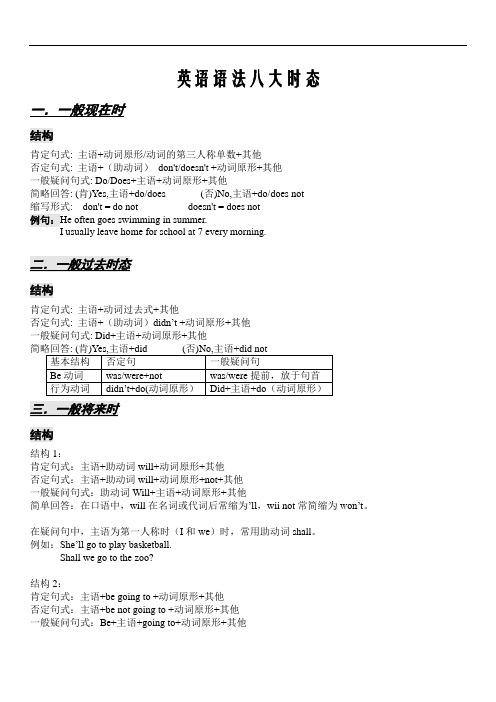
英语语法八大时态一.一般现在时结构肯定句式: 主语+动词原形/动词的第三人称单数+其他否定句式: 主语+(助动词)don't/doesn't +动词原形+其他一般疑问句式: Do/Does+主语+动词原形+其他简略回答: (肯)Yes,主语+do/does (否)No,主语+do/does not缩写形式: don't = do not doesn't = does not例句:He often goes swimming in summer.I usually leave home for school at 7 every morning.二.一般过去时态结构肯定句式: 主语+动词过去式+其他否定句式: 主语+(助动词)didn’t +动词原形+其他一般疑问句式: Did+主语+动词原形+其他基本结构否定句一般疑问句Be动词was/were+not was/were提前,放于句首行为动词didn’t+do(动词原形)Did+主语+do(动词原形)三.一般将来时结构结构1:肯定句式:主语+助动词will+动词原形+其他否定句式:主语+助动词will+动词原形+not+其他一般疑问句式:助动词Will+主语+动词原形+其他简单回答:在口语中,will在名词或代词后常缩为’ll,wii not常简缩为won’t。
在疑问句中,主语为第一人称时(I和we)时,常用助动词shall。
例如:She’ll go to play basketball.Shall we go to the zoo?结构2:肯定句式:主语+be going to +动词原形+其他否定句式:主语+be not going to +动词原形+其他一般疑问句式:Be+主语+going to+动词原形+其他简略回答:(肯)Yes,主语+be (否)No,主语+be not将来时其他表示法1)be going to表示将来表示说话人的打算、计划、安排或根据迹象判断必然或很可能发生的事情。
初中英语八大时态全套精讲及练习题(附答案)
初中英语八大时态全套精讲及练习题.1 一般现在时的用法1)经常性或习惯性的动作,常与表示频度的时间状语连用。
时间状语: every…, sometimes,ofen,always,usually, twice a week, at…, on SundayI leave home for school at 7 every morning. He watches Tv once a week .2) 客观真理,客观存在,科学事实。
The earth moves around the sun. Shanghai lies in the east of China.3) 表示格言或警句中。
Pride goes before a fall. 骄者必败。
注意:此用法如果出现在宾语从句中,即使主句是过去时,从句谓语也要用一般现在时。
例:Columbus proved that the earth is round..4) 现在时刻的状态、能力、性格、个性。
I don't want so much.Ann Wang writes good English but does not speak well.比较:Now I put the sugar in the cup.I am doing my homework now.第一句用一般现在时,用于操作演示或指导说明的示范性动作,表示言行的瞬间动作。
再如:Now watch me, I switch on the current and stand back.第二句中的now是进行时的标志,表示正在进行的动作的客观状况,所以后句用一般现在时。
二. 构成及变化1、be动词的变化肯定句:主语+be(am,is,are)+其它。
如: I am a boy. 我是一个男孩。
否定句:主语+ be + not +其它。
如:He is not a worker. 他不是工人。
英语8种时态分类练习题1
英语时态分类练习1.一般现在时( ) 1. Father usually ______ his newspaper after dinner.A. readB. readsC. readingD. is reading( ) 2. The Blacks often ______ to the cinema on Saturday evenings.A. goB. goesC. is goingD. are going( ) 3.Old Tom usually ______ up at six and ______ sports in the garden.A. gets, dosB. gets, doesC. get, doesD. gets, do( ) 4. The waiters ______ to work at five every morning.A. startB. startsC. startingD. are starting( )5. --______ late for the meeting next time. –Sorry, I won’t.A. Don’tB. Don’t beC. Won’t beD. Be not( )6. My mother _____ noodles, but my father ______.A. likes, doesn’tB. don’t like, doC. likes, didn’tD. didn’t like, do ( )7. The picture ______ nice.A. looksB. is lookedC. lookD. is looking总结:2.一般过去时( )1. Oh, it’s you. I’m sorry I _______ know you _______ here.A. don’t; areB. didn’t; areC. didn’t; wereD. don’t; were( )2. Mr LuXun died in 1936. He _______ a lot of famous novels.A. wroteB. was writingC. has writtenD. would write ( )3. --- How was your weekend on the farm?--- Great! We _______ with the farmers.A. enjoy ourselvesB. went fishingC. will workD. make friends ( )4. Jane _______ a new dress every month when she was in Shanghai.A. buysB. is buyingC. boughtD. will buy ( )5. --- Liu Mei can’t come tonight.--- Why? But she _______ me she would come.A. tellsB. toldC. is toldD. had told( )6. He turned off the light and then _______.A. leavesB. has leftC. will leaveD. left总结:3.一般将来时( )1. --- Jimmy is leaving for a holiday.--- Really? Where _______ he _______?A. has; goneB. will; goC. did; goD. would; go( )2. There _______ a talk on science in our school next Monday.A. will giveB. will beC. is going to giveD. is( )3. It is said that about 400 cars _______ in the factory next month.A. were producedB. will produceC. are producedD. will be produced( )4. --- Come back home every month. --- I _______.A. willB. mustC. shouldD. Can( ) 51. There __________ a meeting tomorrow afternoon.A. will be going toB. will going to beC. is going to beD. will go to be ( ) 6. Charlie ________ here next month.A. isn’t workingB. doesn’t workingC. isn’t going to workingD. won’t work ( ) 7. He ________ very busy this week, he ________ free next week.A. will be; isB. is; isC. will be; will beD. is; will be总结:4.现在完成时练习1. I____ already ____ (see) the film. I ________ (see) it last week.2. _____ he ____ (finish) his work today? Not yet.3. I __________ (work) here since I ______ (move) here in 1999.4. How long ________ the Wangs ______________(stay) here ? For two weeks.5、Both his parents look sad . Maybe they ______what's happened to him .A. knewB. have knownC. must knowD.will know6、—Our country ______ a lot so far .—Yes . I hope it will be even ______ .A.has changed ; wellB.changed ; goodC.has changed ; better总结:5.过去完成时练习题()1.The police found that the house _______and a lot of things_________.A. has broken into, has been stolenB. had broken into, had been stolenC. has been broken into, stolenD. had been broken into, stolen()2.We _________the work by six yesterday evening.A. finishedB.would finishC. had finishedD. had been finished() 3.When I reached home, my parents __________their supper.A.are havingB.have already hadC.have hadD. had already had() 4.He asked me __A___ during the summer holidays.A. where I had beenB. where I had goneC. where had I beenD. where had I gone () 5. What _D___ Jane ____ by the time he was seven?A. did, doB. has, done C did, did. D. had, done()6. I ___C___ 900 English words by the time I was ten。
初中英语八大时态讲解及练习(全)
一、一般现在时:概念:经常、反复发生的动作或行为及现在的某种状况.时间状语:always,usually,often,sometimes,every week (day, year, month…),once a week, on Sundays, etc.基本结构:①be动词;②行为动词否定形式:①am/is/are+not;②此时态的谓语动词若为行为动词,则在其前加don't,如主语为第三人称单数,则用doesn't,同时还原行为动词。
一般疑问句:①把be动词放于句首;②用助动词do提问,如主语为第三人称单数,则用does,同时,还原行为动词。
在一般现在时中,当主语是第三人称单数时,谓语动词要用第三人称单数形式,即常在动词原形后加-s或—es。
一、人称代词he,she, it是第三人称单数.如:He likes watching TV。
他喜欢看电视。
She has lunch at twelve。
她十二点吃午餐。
It looks like a cat。
它看起来像只猫。
(口诀:I用am,you用are,is用于她他它,单数名词用is,复数名词都用are)二、单个人名、地名或称呼作主语;是第三人称单数。
如:①Han Mei looks like her mother。
韩梅看起来像她的母亲。
②Beijing is in China。
北京在中国。
③Uncle Wang often makes cakes. 王叔叔经常做蛋糕。
三、单数可数名词或”this / that / the+单数可数名词"作主语时,是第三人称单数。
如:①A horse is a useful animal. 马是有用的动物.②This book is yours. 这本书是你的。
四、不定代词someone,somebody, nobody, everything, something等及指示代词this,that作主语时,是第三人称单数。
100道题!初中英语八大时态专项练习题(含答案)
100道题!初中英语八大时态专项练习题(含答案)100道题!初中英语八大时态专项练题(含答案)1.The sun always rises in the east。
2.XXX3.Where do you come from。
4.A mother who loves her son will do everything for his happiness。
5.Does milk XXX。
6.He dismissed us with a wave of his hand。
"The lesson is over."7.I haven't seen him in a long time。
but we used to be good friends。
8.She has been studying English for five years。
9.They XXX。
10.The movie had already started by the time we got to the theater。
11.By this time next week。
I will have XXX。
12.They had been waiting for over an hour when the train finally arrived。
13.She would have gone to the concert if she had known about it earlier。
14.The teacher asked if we had done our homework。
15.I will be working late tonight。
so I won't be able to go out with you。
16.He has been living in New York for three years。
- 1、下载文档前请自行甄别文档内容的完整性,平台不提供额外的编辑、内容补充、找答案等附加服务。
- 2、"仅部分预览"的文档,不可在线预览部分如存在完整性等问题,可反馈申请退款(可完整预览的文档不适用该条件!)。
- 3、如文档侵犯您的权益,请联系客服反馈,我们会尽快为您处理(人工客服工作时间:9:00-18:30)。
一般过去时专练( )1. The mother asked the boy _______ down the ladder, but he went on _______ instead.A. come; climbingB. to come; to climbC. to come; climbingD. coming; climbing( )2. The teacher asked the students to close the windows _______ the wind from _______ the papers away.A. to stop; blowingB. stopping; blowingC. to stop; blowD. stopped; blow( )3. The sick man stayed in bed, _______ very terrible.A. feltB. feelingC. is feelingD. was feeling( )4. Yesterday I heard a story _______ by my friend.A. toldB. tellingC. to tellD. tell( )5. The boy was made _______ there for an hour by his father.A. standingB. standC. to standD. stands( )6. I saw him _______ into the small store.A. wentB. goingC. to goD. has gone( )7. He raised his voice to make everybody in the room ______ him clearly.A. hearB. to hearC. hearingD. heard( )8. Our geography teacher told us yesterday that the earth _______ around the sun.A. was movingB. movedC. has movedD. moves( )9. Oh, it’s you. I’m sorry I _______ know you _______ here.A. don’t; areB. didn’t; areC. didn’t; wereD. don’t; were( )10. Mr LuXun died in 1936. He _______ a lot of famous novels.A. wroteB. was writingC. has writtenD. would write( )11. --- How was your weekend on the farm?--- Great! We _______ with the farmers.A. enjoy ourselvesB. went fishingC. will workD. make friends( )12. --- What did Mr Jones do before he moved here?--- He _______ a city bus for over twenty-five years.A. is drivingB. droveC. has drivenD. drives( )13. Jane _______ a new dress every month when she was in Shanghai.A. buysB. is buyingC. boughtD. will buy( )14. --- Liu Mei can’t come tonight.--- Why? But she _______ me she would come.A. tellsB. toldC. is toldD. had told( )15. He turned off the light and then _______.A. leavesB. has leftC. will leaveD. left一般现在时与现在进行时专练( ) 1. Father usually ______ his newspaper after dinner.A. readB. readsC. readingD. is reading( ) 2. The Blacks often ______ to the cinema on Saturday evenings.A. goB. goesC. is goingD. are going( ) 3.Look! The boy ______ with his mother in the pool.A. is swimmingB. is swimmingC. are swimmingD. are swiming( ) 4.--- What is Tom doing in the classroom? --- He ______ something on the blackboard.A. drawsB. drawC. is drawingD. are drawing.( ) 5.Old Tom usually ______ up at six and ______ sports in the garden.A. gets, dosB. gets, doesC. get, doesD. gets, do( ) 6. It’s ten o’clock and Jack ______ still(仍然) ______ his homework.A. is, doB. is, doingC. are, doD. are, doing( ) 7. The waiters ______ to work at five every morning.A. startB. startsC. startingD. are starting( ) 8.I ______ a l etter, so I can’t go out with you.A. is writingB. am writingC. am writeingD. am writting( )9.A hundred days _____ quite a long time.A. isB. areC. haveD. has( )10. --______ late for the meeting next time. –Sorry, I won’t.A. Don’tB. Don’t beC. Won’t beD. Be not( )11. My mother _____ noodles, but my father ______.A. likes, doesn’tB. don’t like, doC. likes, didn’tD. didn’t like, do( )12. The picture ______ nice.A. looksB. is lookedC. lookD. is looking( )13. The students will go to the Summer Palace if it ______ tomorrow.A. don’t rainB. doesn’t rainC. won’t rainD. isn’t rain( )14. We are always ready _______ others.A. to helpingB. to helpC. helpD. helping( )15. I often hear her ______ about the boy.A. talkingB. talkC. to talkD. talked( )16. He’s already a little weak in Chinese, ______ he ?A. isB. isn’tC. hasD. hasn’t( )17.Potatoes are ______ in the field by the farmers.A. growB. growingC. grownD. grew( )18. Does she have a watch? – Yes, she ______.A. haveB. doC. hasD. does( )19. She _____ English very much now.A. is likingB. likesC. likedD. is teaching( )20. She has no paper to _____ . Why not give her some?A. writeB. be writingC. write onD. write in()21. Does Mr Know-all know ______ keys?A. to makeB. how to makeC. how makeD. making( )22. Does your mother ______ English now?。
